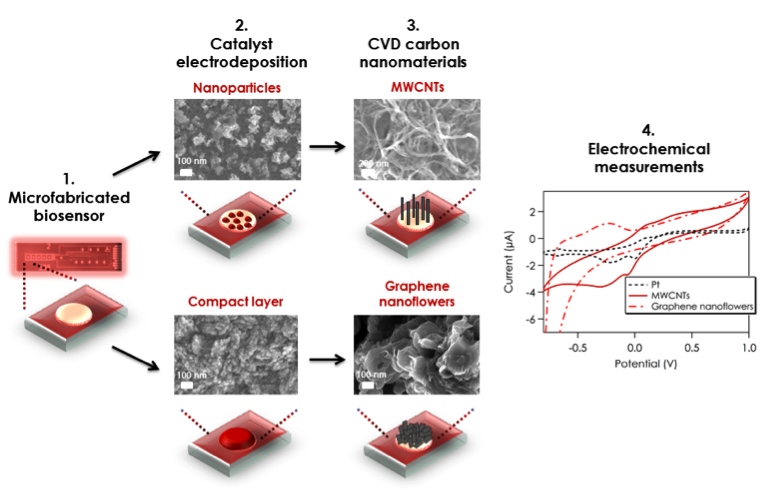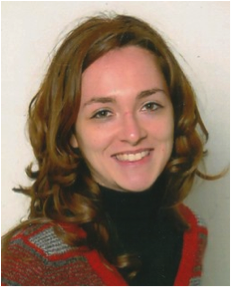Go to
Irene Taurino
Direct growth of nanotubes or graphene nanoflowers on microelectrodes for biosensing applications
Among different biosensors, those based on electrochemical transducers confer numerous advantages as inexpensive and reproducible fabrication procedures and simple analytical measurements with high sensitivity and low detection limits1. Recently, monitoring of metabolites at their very low physio/pathological concentrations is of great importance for diagnostic and therapeutic purposes2. Therefore, a continuing challenge in the fabrication of biosensors is still the improvement of the detection performance. Nanostructured electrodes are currently used for this purpose3. Because of their high aspect ratio and attractive electric properties, multi-walled carbon nanotubes (MWCNTs)3 and graphene4 have attracted particular interest as materials for nanostructuring electrodes. The final properties of the device strongly depend on the method employed to integrate these nanomaterials onto electrodes. Commonly used techniques require a binder (e.g. surfactants, polymers) that negatively affects the device sensing behaviors5. A direct synthesis via chemical vapor deposition (CVD) of carbon nanomaterials onto electrodes is the only method that ensures a close electric contact nanostructures-metal that is of crucial importance for high performance characteristics.

After an overview, I will discuss about the efficient electrochemical properties of directly synthetized MWCNTs for biodetection. Then, the procedure to selectively grow MWCNTs and nanographene flowers onto an array of platinum microelectrodes is shown. Amperometric measurements reveal the power of this integration method for application in biosensor systems.
1 W. Albery, P. Bartlett, A. Cass, D. Craston, B. Haggett, J. Chem. Soc., Faraday Trans. 1 1986, 82(4),1033-1050.
2 A. Salimi, M. Roushani, S. Soltanian, R. Hallaj, Analytical chemistry 2007, 79(19), 7431-7438.
3 J. Gooding, Electrochimica Acta 2005, 50(15), 3049-3060.
4 Y. Shao, J. Wang, H. Wu, J. Liu, I. Aksay, Y. Lin, Electroanalysis 2010, 22(10), 1027-1036.
5 K. Zhang, L. Zhang, X. Zhao, J. Wu, Chemistry of Materials 2010, 22(4), 1392-1401.
About the speaker:
 Irene Taurino was born in Leverano, Italy in 1986. She received the B.Sc. and the M.Sc. degree in Biomedical Engineering both cum laude from Politecnico di Torino (Italy) in 2008 and 2010, respectively. She also got the M.Sc. degree in Biomedical Engineering from Politecnico di Milano (Italy) in 2010. She carried out her Master thesis at EPFL in collaboration with Politecnico di Torino working on carbon nanotube-based biosensors. Currently she is working toward her PhD in the Integrated Systems Laboratory (LSI) under the supervision of Prof. Giovanni De Micheli and Dr. Sandro Carrara.
Irene Taurino was born in Leverano, Italy in 1986. She received the B.Sc. and the M.Sc. degree in Biomedical Engineering both cum laude from Politecnico di Torino (Italy) in 2008 and 2010, respectively. She also got the M.Sc. degree in Biomedical Engineering from Politecnico di Milano (Italy) in 2010. She carried out her Master thesis at EPFL in collaboration with Politecnico di Torino working on carbon nanotube-based biosensors. Currently she is working toward her PhD in the Integrated Systems Laboratory (LSI) under the supervision of Prof. Giovanni De Micheli and Dr. Sandro Carrara.
Secondary navigation
- EPFL Workshop on Logic Synthesis and Emerging Technologies
- Luca Amaru
- Luca Benini
- Giovanni De Micheli
- Srini Devadas
- Antun Domic
- Rolf Drechsler
- Pierre-Emmanuel Gaillardon
- Jie-Hong Roland Jiang
- Akash Kumar
- Shahar Kvatinsky
- Yusuf Leblebici
- Shin-ichi Minato
- Alan Mishchenko
- Vijaykrishnan Narayanan
- Ian O'Connor
- Andre Inacio Reis
- Martin Roetteler
- Julien Ryckaert
- Mathias Soeken
- Christof Teuscher
- Zhiru Zhang
- Symposium on Emerging Trends in Computing
- Layout synthesis: A golden DA topic
- EPFL Workshop on Logic Synthesis & Verification
- Luca Amaru
- Luca Benini
- Robert Brayton
- Maciej Ciesielski
- Valentina Ciriani
- Jovanka Ciric-Vujkovic
- Jason Cong
- Jordi Cortadella
- Giovanni De Micheli
- Antun Domic
- Rolf Drechsler
- Henri Fraisse
- Paolo Ienne
- Viktor Kuncak
- Enrico Macii
- Igor Markov
- Steven M. Nowick
- Tsutomu Sasao
- Alena Simalatsar
- Leon Stok
- Dirk Stroobandt
- Tiziano Villa
- Symposium on Emerging Trends in Electronics
- Raul Camposano
- Anantha Chandrakasan
- Jo De Boeck
- Gerhard Fettweis
- Steve Furber
- Philippe Magarshack
- Takayasu Sakurai
- Alberto Sangiovanni-Vincentelli
- Ken Shepard
- VENUE
- Panel on Circuits in Emerging Nanotechnologies
- Panel on Emerging Methods of Computing
- Panel on The Role of Universities in the Emerging ICT World
- Panel on Design Challenges Ahead
- Panel on Alternative Use of Silicon
- Nano-Bio Technologies for Lab-on-Chip
- Functionality-Enhanced Devices Workshop
- More Moore: Designing Ultra-Complex System-on-Chips
- Design Technologies for a New Era
- Nanotechnology for Health
- Secure Systems Design
- Surface Treatments and Biochip Sensors
- Security/Privacy of IMDs
- Nanosystem Design and Variability
- Past Events Archive
